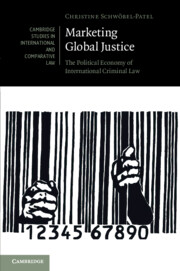Book contents
- Marketing Global Justice
- Cambridge Studies in International and Comparative Law: 152
- Marketing Global Justice
- Copyright page
- Contents
- Figures
- Acknowledgements
- 1 Introduction
- 2 Ad-Vocacy
- 3 A Brand New Justice
- 4 ‘A Picture Worth More Than a Thousand Words’
- 5 ‘Working It’
- 6 Kony 2012
- 7 Special Effects
- 8 Branding the Global (In)Justice Place
- 9 ‘Occupying’ Global Justice
- 10 Conclusion
- Select Bibliography
- Index
- Cambridge Studies in International and Comparative Law: 152
8 - Branding the Global (In)Justice Place
Published online by Cambridge University Press: 22 March 2021
- Marketing Global Justice
- Cambridge Studies in International and Comparative Law: 152
- Marketing Global Justice
- Copyright page
- Contents
- Figures
- Acknowledgements
- 1 Introduction
- 2 Ad-Vocacy
- 3 A Brand New Justice
- 4 ‘A Picture Worth More Than a Thousand Words’
- 5 ‘Working It’
- 6 Kony 2012
- 7 Special Effects
- 8 Branding the Global (In)Justice Place
- 9 ‘Occupying’ Global Justice
- 10 Conclusion
- Select Bibliography
- Index
- Cambridge Studies in International and Comparative Law: 152
Summary
The final case study considers place branding as a feature of marketised global justice. Cities, regions and nation states are branding themselves as global justice – or global injustice – places in order to attract capital. The language, institutions and aesthetics of international criminal law are employed to form the global justice or injustice brand. The chapter includes three ‘mini’ case studies: The Hague, a city that is dedicating significant resources to its brand of ‘City of International Peace and Justice’; South Africa, a state that has invested into a top-down brand of successful transition; and Cambodia, a state in which branding is split down class lines, whereby the elites compete for global justice capital and the rest compete for the far smaller returns of ‘dark tourism’, or global injustice. The guiding issue for this chapter is the de-historicisation of places through branding as well as the de-politicisation that comes with commodification.
- Type
- Chapter
- Information
- Marketing Global JusticeThe Political Economy of International Criminal Law, pp. 213 - 241Publisher: Cambridge University PressPrint publication year: 2021

